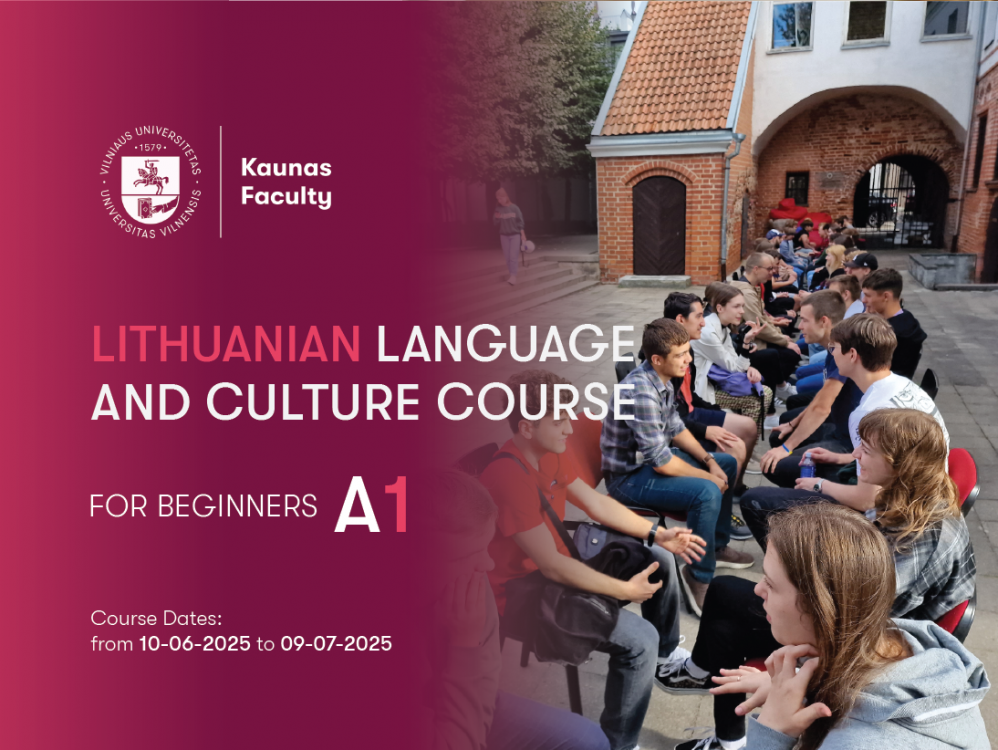About the programme
The study programme is coordinated by The Institute of Economics, Finance and Management

Study area: Social Sciences
Study field: Economics (L100) – major study field, Business and Management (N900) – minor study field (since 2017 admission, Economics is major study field; Management is minor study field).
Qualification awarded: Bachelor of Economics (major study field); Bachelor of Business and Management (minor study field) (since 2017 admission, Bachelor of Social Sciences (major study field)).
Length of programme: 4 years
The study programme of Economics and Management aims to prepare qualified economists with management competences and knowledge of economic systems and principles of organisational activities who are able to solve theoretical and practical economic problems by applying the latest knowledge in economics and management and offering organisational and management tools of implementation of economic decisions.
The study programme of Economics and Management is focused on knowledge and skills of taking responsibility in decision making; conducting research; critical thinking and cooperation (generic competences); functioning of economic system; resolving theoretical and practical economic issues; application of methods of economic analysis and preparation of management tools (subject-specific competences).
Learning outcomes:
- To develop students’ skills required to chart and pursue operational objectives, continuously developing learning skills; plan stages of activities and allocate priorities responsibly in order to achieve performance targets; make decisions aware of the responsibility for the impact of performance targets on the society and environment.
- To develop students’ skills necessary to collect, summarise and analyse information from various sources using information technologies; assess information critically, identifying problems and anticipating options to address them.
- To develop students’ oral and written communication skills in Lithuanian and business English, and their ability to use IT and communication technologies; to develop students’ effective communication skills and their ability to actively generate new ideas and reasonably justify innovative solutions to problems; take and share responsibility for task implementation while organising and implementing team activities.
- To provide specific theoretical knowledge in order to explain categories, principles and methods of economic sciences, integrate knowledge in interdisciplinary studies and areas of professional activities; understand specificities of functioning of economic system and assess the effect of state intervention in the market.
- To provide specific theoretical knowledge in order to analyse and model economic phenomena, assess market changes, formulate summaries based on different theories, research and practice; understand macroeconomic environment and assess its impact on the performance of the organisation, explaining consequences.
- To provide specific theoretical knowledge in order to collect and organise information; process statistical information reflecting economic situation using qualitative and quantitative methods; analyse and forecast economic and financial indicators of the organisation in order to make appropriate decisions on management, investment and financing of activities.
- To provide specific theoretical knowledge in order to assess operations of the organisation proposing informed management decisions in order to address problems of efficiency; prepare management measures to achieve economic goals of the organisation.
- To provide specific theoretical knowledge in order to adapt principles of management in an organisation and anticipate strategic prospects by planning, organising, managing and monitoring all management areas of the organization; identify and solve finance management problems in an organisation by applying theoretical knowledge of public finance management; select and apply methods of business innovation and enhancement of competitiveness; decide on marketing activities in order to ensure competitiveness of the organisation in the market; assess the impact of human and social capital on the effectiveness and development of the organisation, finding the best solution for the interested parties.
Peculiarities of the study process:
Economics and Management bachelor level study programme provides an opportunity to be awarded the qualification of Economics and the adjoining Business and Management. The study programme is composed in such a way that the graduate gains a sufficient amount of both theoretical and practical knowledge for the labour market in the field of Economics; the knowledge is integrally expanded by knowledge in the field of Management.
During the two years of studies, potential economists are taught according to the general Economics study programme; later on, they choose one of the adjoining study directions in Business and Management (since 2017 admission, Management): 1) Finance and Accounting, 2) Business and Public Sector Management, 3) Marketing and Markets Competition; 4) Human and Social Capital Management.
During the fourth year of studies, a three-month long practice in an institution or a company is carried out. Also, the students can take part in Erasmus Practice programme which is carried out in companies abroad. The programme employs the practice model which is composed on the basis of the case study method employed in the University of Aalborg (Denmark). The studies are brought closer to the relevant practical life needs; thus, they provide an opportunity for the students to adjust work and studies.
Graduation:
The programme ends with the writing of final BA thesis (in the major and minor study fields). Those who have successfully graduated from the studies are awarded the bachelor degree in Economics (major study field) and Business and Management (minor study field) (since 2017 admission, Economics is major study field; Management is minor study field).
For more information:
 |
HEAD OF INSTITUTE
Giedrius Romeika
Email:
tel. +370 37422344
Muitinės str. 8, Kaunas, 6 kab.
|

|
ADMINISTRATOR
Vaidilutė Kaminskienė
Email:
tel. +370 37 422344
Muitinės str. 8, Kaunas, 6 kab.
|
Subjects taught
Main study direction (Economics) subjects:
- subjects that provide fundamental knowledge, that improve skills of qualitatively expressing knowledge about social systems and processes:
- Research domain: Introduction to Academic Writing and Business Language. Introduction to Academic Writing introduces the main aspects of research preparation, methods and the research process itself. Business Language enables the students to acquire communicational skills and allows them studying and reading the desired material in a foreign language;
- Mathematics domain: Mathematics, Statistics, Econometrics, Economic Statistics, Financial Mathematics and other;
- Informatics domain:Informatics, Information Technologies, Computer Communications add to the knowledge and skills gained;
- Social subjects that improve enterprise competencies: Civil and Labour Law, Solution Theory, Economic and Political Geography and others.
basic Economics field domain: Microeconomics, Macroeconomics, History of the Economic Thought, Economic Analysis, Capital Economics and Assessment, Economic Benefits of Nature.
The adjoining study direction(Business and Management) is implemented by means of respective subjects in the Management direction. The following are the basic Management subjects: Management, Marketing, Business Organisation, Entrepreneurship, Strategic Business Planning. The following are the intended elective subject groups: (1) Finance and Accounting: Business Accounting, Enterprise of Non-bank Financial Institutions, Taxing Policy, Drafting and Management of Paper Currency Portfolios, Financial Management and others; (2) Business and Public Sector Management: Public Administration, Public Administration Policy, Public Sector Accounting and others; (3) Marketing and Market Competition: Marketing Research, Service Marketing, Marketing Management, E-commerce, Pricing and others; (4) Human and Social Capital Management: Leadership and Variety Management, Organisational Behaviour, Knowledge Management, Human Resource Management, Communication and Negotiation Language and others.
Economics and Management, No. of credits: 240
|
1st year, autumn semester 1
|
1st year, spring semester 2
|
|
Compulsory subjects
- Academic Writing
- Informatics
- Mathematics I/II
- Microeconomics
- Business Language I/IV
- Introduction to Business
|
Compulsory subjects
- Information Technologies
- Macroeconomics
- Mathematics II/II
- Business Language II/IV
- General university level subject
|
|
2nd year, autumn semester 3
|
2nd year, spring semester 4
|
|
Compulsory subjects
- Statistics
- Computer Communications
- Business Language III/IV
- Civil and Labour Law
- Marketing
- General university level subject
Elective subjects
- Solution Theory
- Economic and Political Geography
- Financial Mathematics
|
Compulsory subjects
- Business Language IV/IV
- Financial Accounting
- Econometrics
- History of the Economic Thought
- Business Organisation
- General university level subject
Elective subjects
- Insurance
- Service Economics
- Economic Statistics
- International Economic Relations
|
Finance and Accounting (branch)
|
3rd year, autumn semester 5
|
3rd year, spring semester 6
|
|
Compulsory subjects
- Public Sector Economics
- Business Finance
- Management
- Business Accounting
- Enterprise of Non-bank Financial Institutions
- Taxing Policy
Elective subjects
- Introduction to Projects
- Logistics
- Business Accounting
- Marketing Management
- Sponsorship
- Entrepreneurship
|
Compulsory subjects
- Economic Analysis
- Capital Economics and Assessment
- Monetary Policy
- Drafting and Management of Paper Currency Portfolios
- Financial Management
- Management Accounting
Elective subjects
- Public Sector Accounting
- Investment Management
- Commercial Law
- Organisational Integrity Management
- Small and Medium Business Management
- Social Responsibility
- Human Resource Management
|
|
4th year, autumn semester 7
|
4th year, spring semester 8
|
|
Compulsory subjects
- Economic Benefit of Nature
- Annual Essay
- Practice
Elective subjects
- Banking
- Urban and Regional Economics
- Competition Theory
|
Compulsory subjects
- Strategic Business Planning
- Final BA thesis (Economics)
- Final BA thesis (Management)
Elective subjects
- International Economics
- Social Security Economics
- Labour Economics
- Transport Economics
- Distribution of Service and Commercial Companies
|
Business and Public Sector Management (branch)
|
3rd year, autumn semester 5
|
3rd year, spring semester 6
|
|
Compulsory subjects
- Public Sector Economics
- Business Finance
- Management
- Public Administration
- Money and Credit
- Taxing Policy
Elective subjects
- Introduction to Projects
- Logistics
- Business Accounting
- Marketing Management
- Sponsorship
- Entrepreneurship
|
Compulsory subjects
- Economic Analysis
- Capital Economics and Assessment
- Monetary Policy
- Public Sector Accounting
- Management Accounting
Elective subjects
- Public Sector Accounting
- Investment Management
- Commercial Law
- Organisational Integrity Management
- Small and Medium Business Management
- Social Responsibility
- Human Resource Management
|
|
4th year, autumn semester 7
|
4th year, spring semester 8
|
|
Compulsory subjects
- Economic Benefit of Nature
- Annual Essay
- Practice
Elective subjects
- Banking
- Urban and Regional Economics
- Competition Theory
|
Compulsory subjects
- Strategic Business Planning
- Final BA thesis (Economics)
- Final BA thesis (Management)
Elective subjects
- International Economics
- Social Security Economics
- Labour Economics
- Transport Economics
- Distribution of Service and Commercial Companies
|
|
Marketing and Market Competition (branch)
|
3rd year, autumn semester 5
|
3rd year, spring semester 6
|
|
Compulsory subjects
- Public Sector Economics
- Business Finance
- Management
- Marketing Research
- Service Marketing
- Marketing Management
Elective subjects
- Introduction to Projects
- Logistics
- Business Accounting
- Marketing Management
- Sponsorship
- Entrepreneurship
|
Compulsory subjects
- Economic Analysis
- Capital Economics and Assessment
- E-commerce
- Pricing
- Commercial Company Management
- Human Resource Management
Elective subjects
- Public Sector Accounting
- Investment Management
- Commercial Law
- Organisational Integrity Management
- Small and Medium Business Management
- Social Responsibility
- Human Resource Management
|
|
4th year, autumn semester 7
|
4th year, spring semester 8
|
|
Compulsory subjects
- Economic Benefit of Nature
- Annual Essay
- Practice
Elective subjects
- Banking
- Urban and Regional Economics
- Competition Theory
|
Compulsory subjects
- Strategic Business Planning
- Final BA thesis (Economics)
- Final BA thesis (Management)
Elective subjects
- International Economics
- Social Security Economics
- Labour Economics
- Transport Economics
- Distribution of Service and Commercial Companies
|
|
Human and Social Capital Management (branch)
|
3rd year, autumn semester 5
|
3rd year, spring semester 6
|
|
Compulsory subjects
- Public Sector Economics
- Business Finance
- Management
- Marketing Research
- Knowledge Marketing
- Organisational Behaviour
Elective subjects
- Introduction to Projects
- Logistics
- Business Accounting
- Marketing Management
- Sponsorship
- Entrepreneurship
|
Compulsory subjects
- Economic Analysis
- Capital Economics and Assessment
- Small and Medium Business Management
- Communication and Negotiation Language
- Leadership and Variety Management
- Human Resource Management
Elective subjects
- Public Sector Accounting
- Investment Management
- Commercial Law
- Organisational Integrity Management
- Small and Medium Business Management
- Social Responsibility
- Human Resource Management
|
|
4th year, autumn semester 7
|
4th year,spring semester 8
|
|
Compulsory subjects
- Economic Benefit of Nature
- Annual Essay
- Practice
Elective subjects
- Banking
- Urban and Regional Economics
- Competition Theory
|
Compulsory subjects
- Strategic Business Planning
- Final BA thesis (Economics)
- Final BA thesis (Management)
Elective subjects
- International Economics
- Social Security Economics
- Labour Economics
- Transport Economics
- Distribution of Service and Commercial Companies
|
Career
Graduates of the programme can:
The Economics and Management graduate is able to: evaluate the impact of the State financial system and business environment processes on the activities of economic subjects and the State economics; evaluate the indicators of a company’s economic activity in order to make economically grounded management decisions; manage the fields of marketing, finance, human resources, business strategic planning and other fields.
Career Prospects:
Graduates of the programme can work as economic activity efficiency specialists, business consultants, business organisers, accountants, finance analysts, investment consultants, bookkeepers, management consultants, logistics specialists (managers), sales managers, marketing specialists (managers), market research specialists (managers), personnel specialists (managers); also, as managers of separate departments of economics, finance, supply, labour accounting and other departments in private and public sector organizations; as public officials in various ministries, Seimas and Government Chancellery, autonomous bodies and various institutions and agencies that administer EU structural funds; the graduates can also create individual businesses and manage them.
* Lithuanian Classification of Occupations (LPK 2008) according to the international standard ISCO-88 (The International Standard Classification of Occupations (ISCO),http://www.ilo.org/public/english/bureau/stat/isco/index.htm)
For applicants
 |
HEAD OF INSTITUTE
Giedrius Romeika
Email:
tel. +370 37422344
Muitinės str. 8, Kaunas, 6 kab.
|

|
ADMINISTRATOR
Vaidilutė Kaminskienė
Email:
tel. +370 37 422344
Muitinės str. 8, Kaunas, 6 kab.
|
















